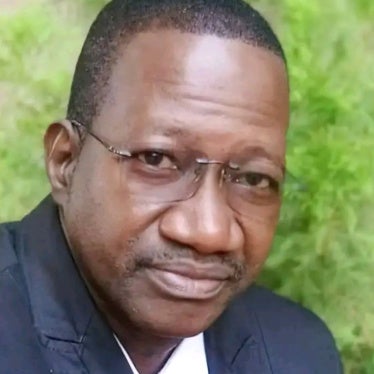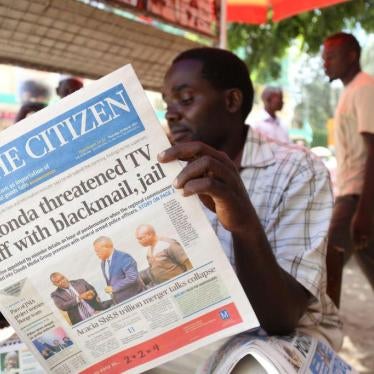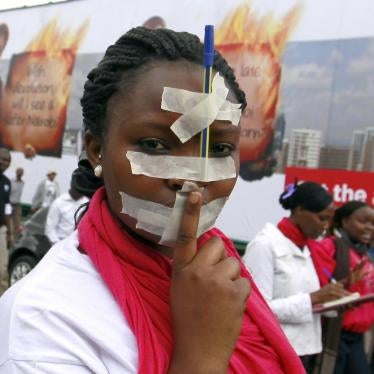(Johannesburg) – The Angolan authorities should immediately end the use of unnecessary and disproportionate force against demonstrators, Human Rights Watch said today. It should also ensure the protection of demonstrators and journalists covering anti-government protests against violence, Human Rights Watch said. Human Rights Watch also expressed concern that more than 30 demonstrators arrested by the authorities are still being held incommunicado, their whereabouts unknown.
On September 3, 2011, police agents and groups of unidentified men apparently allied to the authorities violently dispersed an anti-government rally involving several hundred protesters. The demonstration, at Luanda’s Independence Square, called on President José Eduardo dos Santos – in power for 32 years – to step down. The police said four police officers and three citizens had been injured and that 24 people had been arrested, and blamed the demonstrators for the violence. However, witnesses told Human Rights Watch many more were injured and more than 40 demonstrators arrested.
“The Angolan authorities should disclose the whereabouts of those arrested during the demonstrations and grant them access to lawyers and their families,” said Daniel Bekele, Africa director at Human Rights Watch. “Deliberately withholding such information not only raises concerns about mistreatment in custody, but also violates fundamental due process rights.”
Police have refused to confirm the whereabouts of the demonstrators who were arrested or grant them access to any visitors. At least six demonstrators have since been released.
Unidentified men also attacked several journalists covering the demonstration and seized or broke their cameras and other recording devices, in an apparently coordinated attempt to prevent media coverage and impartial accounts of the violent incidents.
The Luanda governor had given the go-ahead for the rally, which a non-partisan youth movement had called for under the slogan “32 years of corruption and bad governance are enough.” Before the noon start, one of the organizers, Pandito Nerú, was abducted at gunpoint by unidentified men armed with AK-47s. Nerú later told Human Rights Watch that the armed men confiscated material he had prepared for the rally and took him to a distant beach, where they intimidated him with death threats and later released him.
The rally started peacefully at noon and, according to witnesses, took a violent turn after 1 p.m., when a group of participants left the square and moved towards the presidential palace to demand Nerú’s release.
In order to prevent demonstrators from reaching the presidential palace, police agents blocked a nearby road and arrested demonstrators, while groups of unidentified men armed with clubs violently attacked demonstrators and assaulted several journalists. Alexandre Neto, a journalist with the Portuguese-speaking radio service of Voice of America, told Human Rights Watch that unidentified men knocked him down and took the backpacks that contained his mobile phones. Paulo Catarro, leader of a camera team from the Portuguese state television RTP, told the media that unidentified men attacked the team and broke his camera. According to witnesses interviewed by Human Rights Watch, the same unidentified individuals also attacked two journalists from the Angolan state-owned television TPA.
Journalists and demonstrators told Human Rights Watch that the unidentified individuals responsible for the violence seemed to be well-trained and infiltrated the crowd in a coordinated manner. According to the journalists and demonstrators, police arrested a number of protesters, including the movement’s leaders, but did not intervene or arrest the unidentified individuals who were violently attacking demonstrators with clubs and seizing cameras.
Portuguese freelance journalist Antonio Cascais told Human Rights Watch that four unidentified individuals brutally assaulted him at around 7pm shortly before he reached his hotel on his way back from the demonstration. Temporarily in Angola to work on cultural issues, he had no intention to cover the demonstration, yet took notice of the event when passing by. The men also searched him and confiscated his camera – which a colleague had used to take pictures of the demonstration – as well as his mobile phones and press pass. He described what happened to him:
They violently grabbed my throat and threw me to the ground, insulting me, saying that I was ‘instigating confusion.’ They stepped on my face to immobilize me immediately and searched my pockets. They took my camera and phones but didn’t touch the $300 I had on me. Their aim seemed to be neither to beat or rob me but to quickly get hold of the pictures from the demonstration.
Human Rights Watch said the authorities have an obligation to take all reasonable steps to protect peaceful demonstrators and journalists covering demonstrations.
“The police should investigate all acts of violence promptly,” Bekele said. “Police should try to arrest the armed individuals who attacked protesters, to avoid giving the impression that the attackers were acting under official instructions.”
The demonstration at Independence Square continued until around midnight on September 3 when police agents, and the same groups of unidentified individuals who had assaulted journalists and demonstrators before, violently dispersed the remaining crowd.
As Mário Domingos, a demonstration organizer, told Human Rights Watch:
At midnight several police agents told us to leave the square. We refused. Suddenly many of them invaded the square and were all over us. They brutally beat us with clubs and set their dogs free. The dogs bit and injured at least two of us. The police came together with the same individuals who had had hit us and the journalists before. By then, there was no journalist there. Several of us fainted and the police took them away. Some of us managed to flee. We ran as fast as we could. But the police and the ones without uniform followed us. They arrested another 18 of us. Until now we don’t know how many have been arrested nor where they took them. Our families are worried, but the police refuse to give us any information.
A lawyer, Luís do Nascimento, told Human Rights Watch that police officials prevented him from contacting his client Adolfo André, another organizer of the youth movement. He also said that the commander of a police post at the Ilha de Luanda, where he believes a group of protesters are being held, refused to tell him of their whereabouts and the charges against them, alleging “superior orders”. According to the lawyer, the detainees were to appear before a magistrate on September 5, and may face summary trial. However, the authorities have failed to inform lawyers where the trials will take place.
Background
On August 21, police disrupted a news conference being given by the September 3 demonstration organizers in Luanda, seizing their documents and briefly detaining five organizers. On the same day, police also briefly detained VOA journalist Alexandre Neto, and confiscated his camera, after he had taken pictures of the location of the planned news conference. All were released from custody on the same day and the police returned the journalist’s material.
Since early 2011, the Angolan government has stepped up efforts to prevent anti-government demonstrations from taking place in the capital, Luanda. In March 2011, Human Rights Watch documented how the Angolan authorities arrested journalists and intimidated demonstration organizers, in the lead up to planned protests on March 7, which didn’t take place.
Since 2009, the Angolan authorities have obstructed and banned the majority of planned public anti-government demonstrations.








